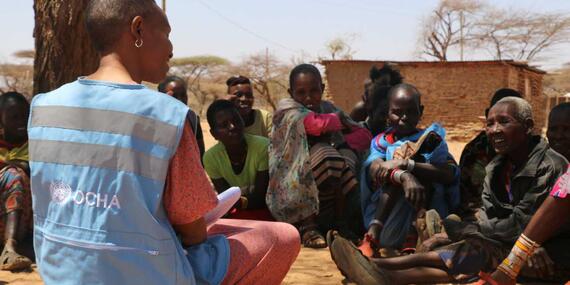UN relief chief: We must be driven by the people we serve

Under-Secretary-General for Humanitarian Affairs and Emergency Relief Coordinator Martin Griffiths' Opening remarks at the European Humanitarian Forum 2023:
Thank you very much indeed for this opportunity on this very important day, at this very important forum. It's a great privilege.
I want to thank the European Union, and all its member states, for the day, but also for the commitment to support the work that so many people in this room lead.
As we've already heard, the figures are dire. But also, there are pockets of belief and commitment and achievement. Last year, for example, we reached 160 million people with assistance around the world, thanks to the generosity and support of so many people here today. That's no small feat.
Humanitarianism has deep, deep roots in Europe. The continent has long built bridges between all its citizens and extended that link with the rest of the world. Europe's impulse to help people in need, in places far away, as well as near, must be protected through forums like this, and nurtured and indeed, we hope, expanded.
As you know well, from the side of the United Nations we have a range of response plans, pooled funds around the world - vehicles for that humanitarian work and for the expression of those principles.
And as we have already heard this morning, these plans are, on average, barely half funded. However, I remain somewhat optimistic that this year, we will end better than last.
The key issue is, as always, how do we make sure that the system that we are all involved in, that we represent, and the many people here lead, is fit for purpose? Let me highlight two ways to look at this.
The raison d'etre of the humanitarian system is to pragmatically address people's need for relief and protection. The humanitarian community, it follows, must be driven by the people we serve.
That means listening closely to what people in crisis tell us - waiting, stopping, listening - so that they can tell us and better inform the response that is driven by their observations, their priorities, and their views.
That is not easy. It is essential.
Which brings me to the second point: that we must always do this in concert with others. Most crises are compound in nature, driven by a combination of armed conflict, climate change, failed development, political turmoil, epidemics, human rights violations, economic decline, the many, many horsemen of our apocalypse.
In the worst cases people end up facing famine.
We humanitarians cannot address these challenges in silos. We can only succeed when we stand shoulder to shoulder with those working for climate justice, with those investing in development, in peace, public health and human rights. Mr. [Josep] Borrell has just referred to the triple nexus as a guide.
And that world that we look at, in which we exit our silos, has entrusted us with an exceptional agenda, great responsibilities, great values.
We already enjoy exceptional partnership, within and between and among the humanitarian community. We need to go beyond that. We need to partner with those who are not humanitarian, with those who do things differently. And even with those who have different values.
Governments, civil society activists, the private sector, as has been referred to by Tomas [Tobé]. We need all of these to help us do our work better.
When we listen carefully, and slowly, and with time and with patience, to what people in the world's many crisis zones tell us, it's very clear: they expect all of us, not just humanitarians, all the communities of value, to be at their side, to have exactly the solidarity that Josep [Borrell] was talking about.
It's a privilege to be here in Europe. It's a privilege to be part of your discussions. And it's a privilege to be part of your partnerships. We have a great year ahead of us: demanding, difficult and necessary.
Thank you very much.
